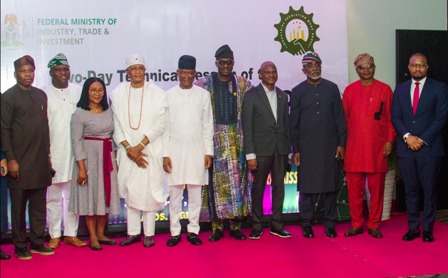The Federal Government of Nigeria has called for more policy action and collaborative growth in the nation’s industrial sector.
This call was highlighted recently at the technical session of the Industrial Revolution Work Group (IRWG), convened by the Federal Ministry of Industry, Trade and Investment (FMITI) at Radisson Blu Hotel Ikeja, Lagos.
A key feature of the session was the unveiling of five thematic working groups tasked with advancing reforms across critical enablers of industrial development: Affordable Long-Term Finance and Incentives, Energy Security and Infrastructure Development, Bureaucratic Reform and Industry Regulations, Patronage of Made-in-Nigeria Products and Control of Counterfeits and Skills Development and Innovation.
According to the Director General, National Automotive Design and development Council (NADDC), who participated in the event, the pillars strongly align with the council’s mandate to promote a sustainable, innovative, and globally competitive automotive industry.
“The Council’s ongoing work on the Nigeria Automotive Industry Development Plan (NAIDP), which seeks to grow local manufacturing capacity, reduce dependence on imports, and enhance technical skills, directly complements the IRWG’s objectives.
“With its active participation, NADDC reinforced its commitment to positioning Nigeria as a hub for automotive production in Africa,” he added.
In a keynote address, the nation’s Minister of State for Industry, Senator John Owan Enoh, applauded stakeholders for the leadership and commitment shown towards the advancement of Nigeria’s industrial policy.
Stressing the importance of collaborative engagement across institutions, the minister highlighted the need to transition from policy discussions to measurable actions in Nigeria’s industrial landscape.
Themed :”From Activities to Outcomes: Driving Industrial Renaissance”, the two- day programme brought together senior government officials, , private sector leaders, and development partners to address long-standing challenges around policy execution, industrial financing, infrastructure and workforce development. For the automotive sector, an identified cornerstone of Nigeria’s industrial potential, the dialogue presented renewed opportunities for alignment, investment and reform.
The presence of the Director General of NADDC, Mr. Oluwemimo Joseph Osanipin underscored the strategic positioning of the automotive sector sector within Nigeria’s broader industrial transformation agenda. The NADDC’S participation at the high-level technical session also signaled the Council’s commitment to aligning with national policy initiatives aimed at accelerating industrial growth and deepening sectorial integration.
©Copyright MOTORING WORLD INTERNATIONAL. All rights reserved. Materials, photographs, illustrations and other digital content on this website, may not be reproduced, published, broadcast, rewritten or redistributed in whole or in part without prior written permission from Motoring World International
Contact: editor@motoringworldng.com





